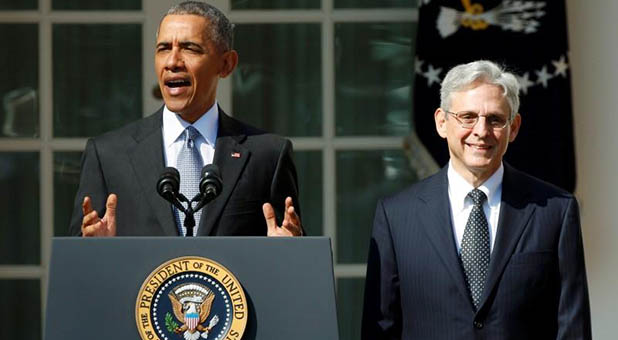Now Even the Washington Times Thinks President Obama Could Still Appoint Judge Garland
With a number of headlines popping up over the weekend from liberal mainstream media outlets, it was a bit of a surprise to see the consistently conservative Washington Times jump on the bandwagon Monday with this header:
“Obama could still force Merrick Garland onto court during ‘intersession recess'”
Keep in mind, the liberal mainstream media is desperate in a way that is almost unnatural to see President Obama score as many quick and decisive victories as possible in the final days of his lame-duck presidency. We can’t speak as to the motivation for The Times‘ article Monday, but this is what was reported:
Mr. Obama’s moment will come just before noon, in the five minutes that the Senate gavels the 114th Congress out of session and the time the 115th Congress begins.
In those few moments the Senate will go into what’s known as an “intersession recess,” creating one golden moment when the president could test his recess-appointment powers by sending Judge Garland to the high court.
A smattering of activists has asked him to give it a try, but Mr. Obama has given no indication that he’s thinking about it. The White House didn’t respond to a request for comment for this story.
If only it were true. The Times eventually sets the record straight, but the misleading headline likely got a lot of hits from conservatives and Christians who have eagerly awaiting President-elect Donald Trump’s first Supreme Court nomination from “the list.”
Here’s why it won’t happen.
As Washington, D.C., has become increasingly polarized, and President Barack Obama has increasingly sought extra-constitutional means of advancing his agenda (i.e. without the consent of Congress), there came a point when the Supreme Court had to come to a conclusion about recess appointments. Those types of appointments are allowed under Article II, Section 2 of the U.S. Constitution.
But, as Alexander Hamilton wrote in Federalist 67:
The ordinary power of appointment is confined to the President and Senate jointly, and can therefore only be exercised during the session of the Senate; but as it would have been improper to oblige this body to be continually in session for the appointment of officers and as vacancies might happen in their recess, which it might be necessary for the public service to fill without delay …
So, the real question became, “what constitutes a recess of Congress, and specifically, the Senate?”
That was decided by the Supreme Court in 2012 in NLRB v. Noel Canning—a unanimous decision—that determined that any temporary recess of less than 10 days doesn’t constitute a recess for the purposes of Article II, Section 2. Essentially, Justice Stephen Breyer wrote, “the Senate is in session when it says it is.”
Shortly before noon EST, the 114th Congress will be gaveled out of session and put into recess. The new, 115th Congress will be gaveled into session at noon. The whole process will take less than five minutes, during which time the Congress will be in what is called an “intersession recess.”
But, as the Supreme Court has already decided—unanimously, and in an opinion written by one of the court’s liberal jurists—that isn’t long enough for the president to make a recess appointment. {eoa}
















































